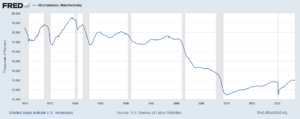
Photograph Source: shizhao – CC BY-SA 2.0
The United States suffered from a massive loss of manufacturing jobs in the 00s. This has come to be known as the “China Shock,” since it was associated with a flood of imports, especially from China, and a rapid rise in the U.S. trade deficit.
In the decade from December of 1999 to December of 2009, the economy lost more than 5.8 million manufacturing jobs, or more than one in three of the manufacturing jobs at the start of the decade. The vast majority of this job loss took place before the start of the Great Recession in December of 2007.
This sort of job loss was not typical for the manufacturing sector. While it lost jobs in the 1990s also, the drop was just 601,000, a bit more than one tenth as much as in the next decade. Since 2009, the manufacturing sector has actually been adding jobs, so the plunge in jobs in the manufacturing sector in the first decade of this century really was an anomaly.

The loss of manufacturing jobs, which had been more highly unionized and better paying than most jobs in the private sector, also had a devastating impact on many cities and towns across the industrial Midwest. When the manufacturing jobs left town, so did much of the tax revenue and purchasing power.
A recent piece in the Guardian implied that the job loss associated with a green transition could provide a comparable hit to the labor market. This is not true.
The number of jobs plausibly at stake in a green transition is almost certainly less than one-tenth as large as was the case with the China shock. The basis for the Guardian piece is a recent NBER paper by Mark Curtis, Layla Kane, and Jisung Park, that looked at what happened to workers who transitioned out of jobs in fossil fuels or related industries. The paper found that a relatively small share of these workers found jobs in green sectors of the economy. It also found that a large share of these workers ending up taking jobs in occupations that paid considerably less than the jobs they lost.
While this is not a good picture, it is important to get a sense of the number of workers involved. The paper analyzed just over 1.7 million transitions from jobs in fossil fuels and related industries, over the 21 years from 2002-2022.[1] By comparison, data from the Bureau of Labor Statistics’ Job Openings and Labor Turnover Survey indicate that there were more than 44 million instances where workers left or were fired from manufacturing jobs, in the nine years from 2001 through 2009. (The Survey starts in December of 2000.)[2]
These figures are not entirely comparable, since presumably people who retired or dropped out of the labor force were not counted as making transitions in the Curtis, Kane, and Park piece. Also, some of the people in the JOLTS data likely appear multiple times from the same job. For example, if a worker was laid off more than once from a job, they could count two or more times in the JOLTS data, whereas they would not be counted as making a transition unless they found a new job with another employer.
While recognizing these inconsistences, it still likely the case that the number of people leaving manufacturing jobs in the nine years from 2001 to 2009 was close to 20 times as large as the number of people transitioning out of fossil fuels and related industries in the 21 years from 2002 to 2022. Adjusting for the differences in the number of years, the job loss in manufacturing is close to forty times as much on an annual basis as the transitions associated with the shift to a green economy.
The job loss associated with the conversion to a green economy should not be trivialized. For many workers and their families, the loss of a good-paying job in the oil or gas industry can be traumatic. In many cases they will never find a job that pays a comparable wage. But it is a mistake to imply that the number of jobs at risk is comparable to the number of manufacturing jobs lost to trade in the first decade of the century.
It would be great if government support can facilitate the transitions for the affected workers, but the downside risk here is nowhere near as large as what we saw due to the opening of trade in manufacturing goods in the 00s. It would be unfortunate if the fossil fuel industry used this risk as an excuse to slow the transition to a green economy.
Notes.
[1] This number was obtained by using the percentage of transitions from each sector in tables 2a and 2b.
[2] Job turnover is much less than net job loss because new workers typically fill jobs that other workers left, and job creation in factories that are growing offsets job loss in factories with declining employment.
This first appeared on Dean Baker’s Beat the Press blog.
This content originally appeared on CounterPunch.org and was authored by Dean Baker.
Dean Baker | Radio Free (2023-08-22T05:43:20+00:00) Job Loss from Going Green is Nothing Like the Loss of Manufacturing Jobs Due to Trade. Retrieved from https://www.radiofree.org/2023/08/22/job-loss-from-going-green-is-nothing-like-the-loss-of-manufacturing-jobs-due-to-trade/
Please log in to upload a file.
There are no updates yet.
Click the Upload button above to add an update.